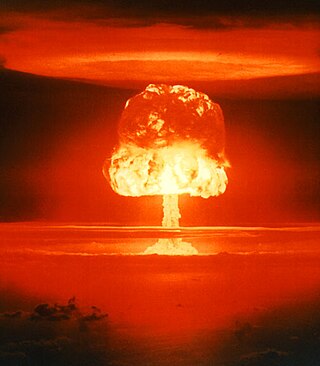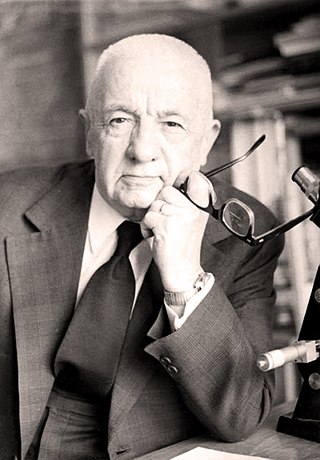
International Physicians for the Prevention of Nuclear War (IPPNW) is a non-partisan federation of national medical groups in 63 countries, representing doctors, medical students, other health workers, and concerned people who share the goal of creating a more peaceful and secure world free from the threat of nuclear annihilation. The organization's headquarters is in Malden, Massachusetts. IPPNW was awarded the Nobel Peace Prize in 1985.

Sir Joseph Rotblat was a Polish and British physicist. During World War II he worked on Tube Alloys and the Manhattan Project, but left the Los Alamos Laboratory on grounds of conscience after it became clear to him in 1944 that Germany had ceased development of an atomic bomb.

The Pugwash Conferences on Science and World Affairs is an international organization that brings together scholars and public figures to work toward reducing the danger of armed conflict and to seek solutions to global security threats. It was founded in 1957 by Joseph Rotblat and Bertrand Russell in Pugwash, Nova Scotia, Canada, following the release of the Russell–Einstein Manifesto in 1955.

Castle Bravo was the first in a series of high-yield thermonuclear weapon design tests conducted by the United States at Bikini Atoll, Marshall Islands, as part of Operation Castle. Detonated on March 1, 1954, the device remains the most powerful nuclear device ever detonated by the United States and the first lithium deuteride-fueled thermonuclear weapon tested using the Teller-Ulam design. Castle Bravo's yield was 15 megatons of TNT [Mt] (63 PJ), 2.5 times the predicted 6 Mt (25 PJ), due to unforeseen additional reactions involving lithium-7, which led to radioactive contamination in the surrounding area.
The Canberra Commission on the Elimination of Nuclear Weapons was initiated by the prime minister of Australia the Honourable Paul Keating in November 1995 to deliberate on issues of nuclear proliferation and how to eliminate the world of nuclear weapons. The result of the commission was published as the Canberra Report in August 1996. The report was presented by Alexander Downer, Australia's Minister of Foreign Affairs, to the United Nations on 30 September 1996 and the Conference on Disarmament on 30 January 1997.

The Russell–Einstein Manifesto was issued in London on 9 July 1955 by Bertrand Russell in the midst of the Cold War. It highlighted the dangers posed by nuclear weapons and called for world leaders to seek peaceful resolutions to international conflict. The signatories included eleven pre-eminent intellectuals and scientists, including Albert Einstein, who signed it shortly before his death on 18 April 1955. Shortly after the release, philanthropist Cyrus S. Eaton offered to sponsor a conference—called for in the manifesto—in Pugwash, Nova Scotia, Eaton's birthplace. The conference, held in July 1957, became the first of the Pugwash Conferences on Science and World Affairs.

Georgi Nadjakov was a Bulgarian physicist. He was a corresponding member of the Göttingen Academy of Sciences (1940) in Germany, member of the Bulgarian Academy of Sciences (1945) and member of the Russian Academy of Sciences (1958).
The OPANAL is an international organization which promotes a non-aggression pact and nuclear disarmament in much of the Americas. In English, its name is the Agency for the Prohibition of Nuclear Weapons in Latin America and the Caribbean. The agency was created as a result of the Treaty of Tlatelolco, ratified in 1969, which forbids its signatory nations from use, storage, or transport of nuclear weapons.

Eugene Rabinowitch was a Russian-born American biophysicist who is known for his work in photosynthesis and nuclear energy. He was a co-author of the Franck Report and a co-founder in 1945 of the Bulletin of the Atomic Scientists, a global security and public policy magazine, which he edited until his death.
The British Atomic Scientists Association, was founded by Joseph Rotblat in 1946.
The International Network of Engineers and Scientists for global responsibility (INES) is an independent non-profit-organization concerned about the impact of science and technology on society.
Nobelity is a feature documentary which looks at the world's most pressing problems through the eyes of Nobel laureates, including Desmond Tutu, Sir Joseph Rotblat, Ahmed Zewail and Wangari Maathai.

Global Zero is an international non-partisan group of 300 world leaders dedicated to achieving the elimination of nuclear weapons. The initiative, launched in December 2008, promotes a phased withdrawal and verification for the destruction of all devices held by official and unofficial members of the nuclear club. The Global Zero campaign works toward building an international consensus and a sustained global movement of leaders and citizens for the elimination of nuclear weapons.
Global Zero is a term in the literature of arms control that refers to the worldwide elimination of a weapons system, especially nuclear weapons or a particular class of nuclear weapons. In negotiations over the Intermediate-Range Nuclear Forces Treaty, both sides discussed and eventually agreed to the "global zero option" in delivery vehicles with intermediate range. This option differed from other proposals that would only restrict the use of intermediate-range delivery vehicles in the European theater. The term "global zero" has also been used in connection with de-alerting nuclear weapons and the elimination of tactical nuclear weapons.

Countdown to Zero is a 2010 documentary film by British filmmaker Lucy Walker. The film argues that the likelihood of the use of nuclear weapons has increased since the end of the Cold War due to terrorism, nuclear proliferation, theft of nuclear materials and weapons, and other factors.

Nuclear Tipping Point is a 2010 documentary film produced by the Nuclear Threat Initiative. It features interviews with four American government officials who were in office during the Cold War period, but are now advocating for the elimination of nuclear weapons: Henry Kissinger, George Shultz, Sam Nunn, and William Perry. Michael Douglas narrated the film.

The International Day against Nuclear Tests is observed on August 29. It was established on December 2, 2009, at the 64th session of the United Nations General Assembly by the resolution 64/35, which was adopted unanimously.
Bhalchandra Madhav Udgaonkar, popularly as B.M. Udgaonkar, was an Indian theoretical particle physicist, scientist, educationist and the co-editor of A Nuclear-Weapon-Free World: Desirable?, Feasible?. His contributions have been reported in the development of Homi Bhabha Centre for Science Education (HBCSE), Institute of Physics, Bhubaneswar and Marathi Vidnyan Parishad (MaViPa). An alumnus of the Raja Shivaji Vidyalaya, he is a member of the Institute of Advanced Study, USA, a scientists' community, and a former president of the Marathi Vidnyan Parishad. He is the author of several books and has contributed content to books written by others. The Government of India awarded him the third highest civilian honour of the Padma Bhushan, in 1985, for his contributions to science and technology.

Patricia Joyce Lindop FRCP was British professor of radiation biology at the University of London and the organiser of at least 100 "Pugwash" meetings at which scientists met to discuss their campaign for nuclear disarmament.












